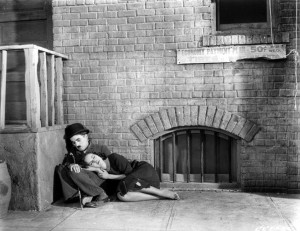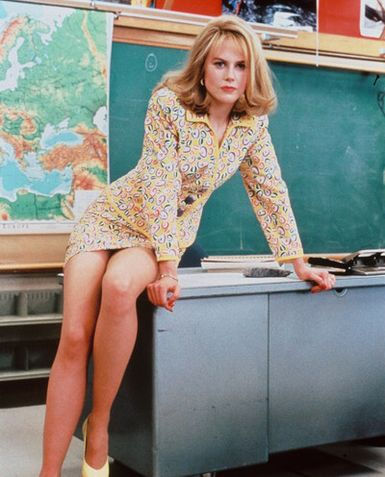NEW: Her Socialist Smile (John Gianvito, USA)
OLD: Une Histoire de Vent/A Tale of the Wind (Joris Ivens & Marceline Loridan, 1988, France)
Two quixotic adventures in filming the unfilmable, both made by indefatigable masters of bearing witness. Read more
From the Chicago Reader (January 2, 2004). — J.R.

I don’t have much patience with colleagues who dismiss Charlie Chaplin by saying that Buster Keaton was better (whatever that means). To the best of my knowledge, with the arguable exception of Dickens, no one else in the history of art has shown us in greater detail what it means to be poor, and certainly no one else in the history of movies has played to a more diverse audience or evolved more ambitiously from one feature to the next. The recent European release of his eight major features on DVD, digitally restored and with superb bonus materials, has been matched over here by only four titles so far, including Modern Times (1936), the second of his two Depression-era masterpieces — though viewing it on a big screen is required for maximal impact. The opening sequence of the Tramp on the assembly line is possibly his greatest slapstick encounter with the 20th century, and as Belgian filmmakers Luc and Jean-Pierre Dardenne brilliantly observe on one of the DVD extras, the famous shot of his being run through machinery equates him with a strip of film. Still, there’s more hope here than in City Lights, perhaps because this time the Tramp has Paulette Goddard, another plucky urchin, to keep him company. Read more
From the Chicago Reader (October 3, 1995); slightly tweaked in late 2013. — J.R.
 If, like me, you find things to admire in many of Gus Van Sant’s films, you may be especially gratified by what he’s done with this satirical anti-TV script by Buck Henry — suggested by a real-life crime and adapted from a Joyce Maynard novel — and a spot-on performance by Nicole Kidman that may be the best of its kind since Tuesday Weld’s wicked sexual turns in Pretty Poison and Lord Love a Duck. Charting the ruthlessness of an ambitious bimbo telecaster in Little Hope, New Hampshire, this staccato black comedy sustains its brilliant exposition and narration until the plot turns to premeditated murder, complete with hapless and semicoherent teenage accomplices. The movie loses much of its pitch and many of its laughs at this juncture, and there’s an uncomfortable tendency to equate the falsity and venality of TV too exclusively with Kidman’s character, thereby bypassing golden opportunities offered by Wayne Knight (as a station boss) and an uncredited George Segal to make the target less gender specific. But much of this is good nasty fun, with a fine secondary cast that includes Matt Dillon, Joaquin Phoenix, Alison Folland, Casey Affleck, Illeana Douglas, and Dan Hedaya; also look for striking cameos by David Cronenberg and screenwriter Buck Henry. Read more
If, like me, you find things to admire in many of Gus Van Sant’s films, you may be especially gratified by what he’s done with this satirical anti-TV script by Buck Henry — suggested by a real-life crime and adapted from a Joyce Maynard novel — and a spot-on performance by Nicole Kidman that may be the best of its kind since Tuesday Weld’s wicked sexual turns in Pretty Poison and Lord Love a Duck. Charting the ruthlessness of an ambitious bimbo telecaster in Little Hope, New Hampshire, this staccato black comedy sustains its brilliant exposition and narration until the plot turns to premeditated murder, complete with hapless and semicoherent teenage accomplices. The movie loses much of its pitch and many of its laughs at this juncture, and there’s an uncomfortable tendency to equate the falsity and venality of TV too exclusively with Kidman’s character, thereby bypassing golden opportunities offered by Wayne Knight (as a station boss) and an uncredited George Segal to make the target less gender specific. But much of this is good nasty fun, with a fine secondary cast that includes Matt Dillon, Joaquin Phoenix, Alison Folland, Casey Affleck, Illeana Douglas, and Dan Hedaya; also look for striking cameos by David Cronenberg and screenwriter Buck Henry. Read more




 If, like me, you find things to admire in many of Gus Van Sant’s films, you may be especially gratified by what he’s done with this satirical anti-TV script by Buck Henry — suggested by a real-life crime and adapted from a Joyce Maynard novel — and a spot-on performance by Nicole Kidman that may be the best of its kind since Tuesday Weld’s wicked sexual turns in Pretty Poison and Lord Love a Duck. Charting the ruthlessness of an ambitious bimbo telecaster in Little Hope, New Hampshire, this staccato black comedy sustains its brilliant exposition and narration until the plot turns to premeditated murder, complete with hapless and semicoherent teenage accomplices. The movie loses much of its pitch and many of its laughs at this juncture, and there’s an uncomfortable tendency to equate the falsity and venality of TV too exclusively with Kidman’s character, thereby bypassing golden opportunities offered by Wayne Knight (as a station boss) and an uncredited George Segal to make the target less gender specific. But much of this is good nasty fun, with a fine secondary cast that includes Matt Dillon, Joaquin Phoenix, Alison Folland, Casey Affleck, Illeana Douglas, and Dan Hedaya; also look for striking cameos by David Cronenberg and screenwriter Buck Henry.
If, like me, you find things to admire in many of Gus Van Sant’s films, you may be especially gratified by what he’s done with this satirical anti-TV script by Buck Henry — suggested by a real-life crime and adapted from a Joyce Maynard novel — and a spot-on performance by Nicole Kidman that may be the best of its kind since Tuesday Weld’s wicked sexual turns in Pretty Poison and Lord Love a Duck. Charting the ruthlessness of an ambitious bimbo telecaster in Little Hope, New Hampshire, this staccato black comedy sustains its brilliant exposition and narration until the plot turns to premeditated murder, complete with hapless and semicoherent teenage accomplices. The movie loses much of its pitch and many of its laughs at this juncture, and there’s an uncomfortable tendency to equate the falsity and venality of TV too exclusively with Kidman’s character, thereby bypassing golden opportunities offered by Wayne Knight (as a station boss) and an uncredited George Segal to make the target less gender specific. But much of this is good nasty fun, with a fine secondary cast that includes Matt Dillon, Joaquin Phoenix, Alison Folland, Casey Affleck, Illeana Douglas, and Dan Hedaya; also look for striking cameos by David Cronenberg and screenwriter Buck Henry.